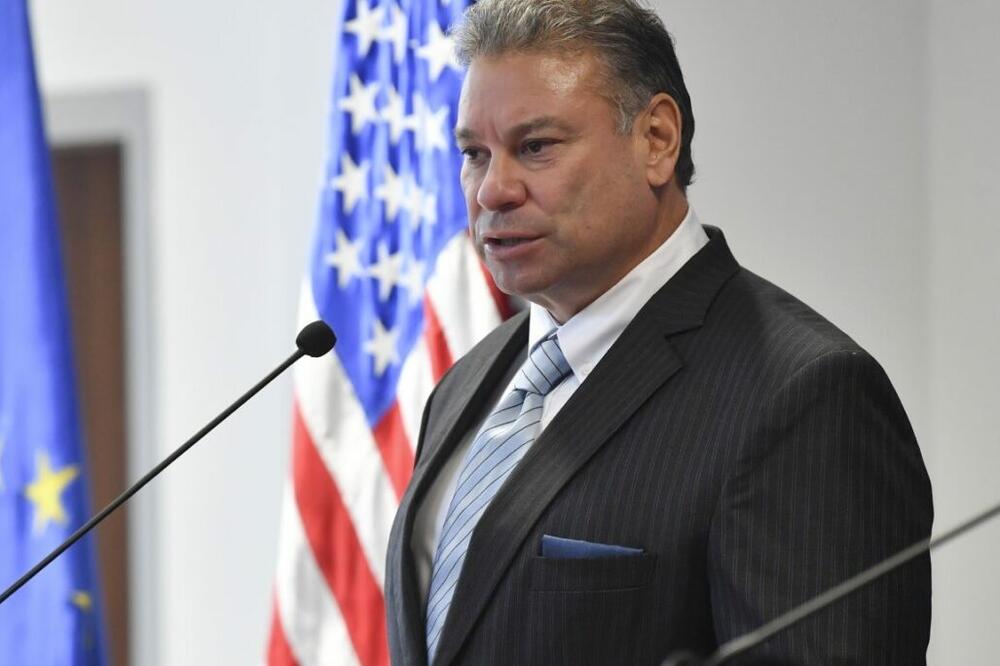The US special envoy for the Western Balkans, Gabriel Escobar, said that he failed to convince the Prime Minister of Kosovo, Aljbin Kurti, to respond to the West's concerns regarding the ban on the use of the Serbian dinar in Kosovo.
"We need a solution. That's why I asked the Prime Minister to suspend the decision while we, together with the European Union, i.e. the USA and Kosovo, work on a long-term solution that would meet your needs. This includes electronic transfers in euros through the Kosovo system. But, now, we have to do something urgently. Unfortunately, I failed to oblige him to do that," Escobar said in an interview with Radio Free Europe at the end of his visit to Kosovo.
Escobar said that it was the "latest" response from Prime Minister Kurti today, but that he "still hopes" that on Tuesday at the meeting of the main negotiators of Belgrade and Pristina, Brussels "will find an immediate solution to enable transfers, in cash in euros, to the affected people ".
He repeated that the decision of the Central Bank of Kosovo on the dinar was "an uncoordinated move that created great difficulties for individual citizens of Kosovo".
According to Eskobar Kurti, he said that the decision of the Central Bank of Kosovo is "a decision of an independent institution that does not want to interfere" and that it is an inconvenience for people that can easily be overcome or replaced by payments from the Kosovo government.
"But none of that will happen quickly. That's why we ask for the suspension of the application of that decision. Normally, the Central Bank and the Ministry of Finance do everything to avoid creating instability or unpredictability in the economy. And this has led to exactly that," he added.
Escobar said that he does not believe that the decision on the dinar was made to punish the Serbs.
"I don't believe in that. But because this Government of Self-Determination doesn't have a long history of ruling, I believe that sometimes there are people who don't think about the consequences. That's why I characterized it in Brussels as somewhat incompetent," he said.
Escobar assessed that "everyone recognized that there were unintended consequences that could have been foreseen if the decision had been coordinated." "Quinta has a lot of experience in currency conversion from one currency to the euro, but it took a long time. We only had five weeks," he said.
Asked why Kurti decided to continue with the dinar ban knowing that this issue could have been resolved through the Association of Municipalities with a Serbian majority, Escobar said that it was a matter for him (Kurti).
"But the truth is that what we don't want to do is to undermine the potential of the Community of Municipalities with a Serbian majority, which is very important. It is very important for the future of Kosovo," he added.
Escobar said that "there is a lot of frustration with the Self-Determination government, not only in Washington, but also in Brussels, Rome, Berlin and Paris.
"As we approach the twenty-fifth anniversary of the NATO action, it is important that people understand that the strength of the relationship between the US and Kosovo is in the relationship between the people. We will always be a close friend of Kosovo, but that does not mean that we will not have differences of opinion with individuals and with individual governments, and I think that's where we are now. We are entering a period in which we have a lack of communication and we, at least from the American side, are doing everything we can to repair that relationship," he said.
Escobar stated that the relations between the USA and Kosovo are not only based on common interests, but also on common values, one of which is commitment to human rights.
"The fact that the governments of the USA and Kosovo are having difficulties in their relations not because of their policies towards Russia or Ukraine or China, but because of the way they treat minorities. That should be a wake-up call to the prime minister and his government about where that relationship is going," added Escobar in an interview for RSE.
Bonus video:




